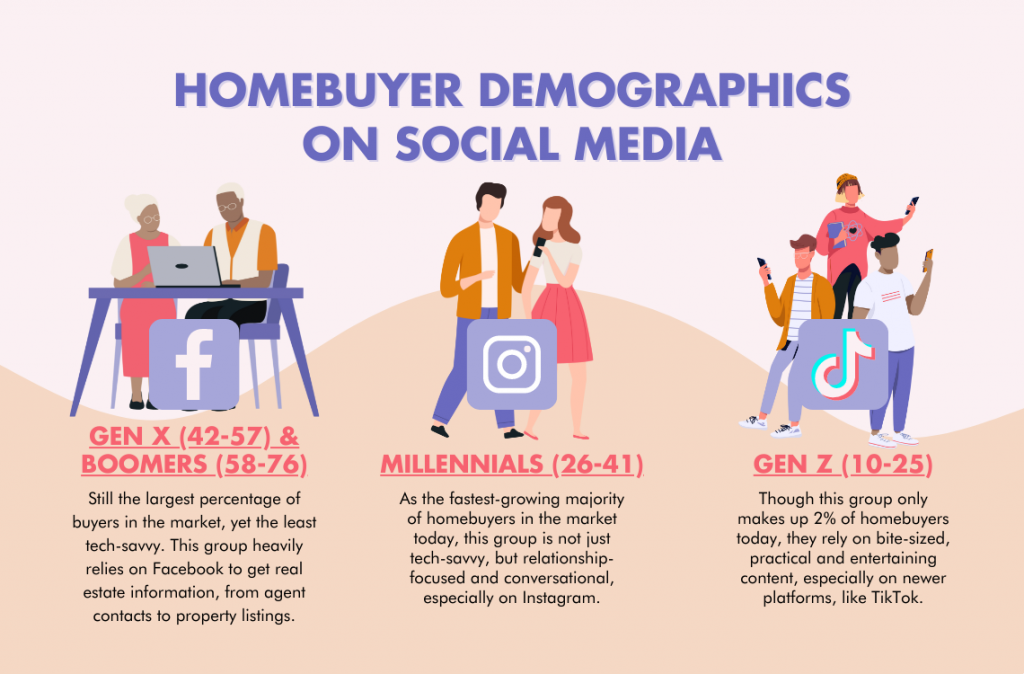Figuring out exactly who your target audience is may seem simple, but there is much more to it. As we head into 2022, agents face the challenge of marketing and catering to not just one generation of homebuyers, but three. From Gen X and boomers to millennials and the newest group of homebuyers, Gen Z, marketing has become more complex, especially on social media.
According to NAR’s 2021 Home Buyers and Sellers Generational Trends Report, millennials make up the largest share of homebuyers at 37%, which has continued since the release of the 2014 report. Gen Z buyers, new to this year’s report, are becoming some of the most important buyers for agents to connect with, and with their penchant for social media, having a specific strategy, such as highlighting more video content, is vital. And though Gen Z and millennials may seem like the perfect target audience for agents, Gen X and baby boomers are also active on these platforms, which means you may need multiple strategies and a clear understanding of what each generation is looking for.
Modernizing the Home-Search Process
NAR’s report also takes a look at how different generations go about searching for homes and real estate agents, with a whopping 97% of homebuyers starting their search online. Because of this, it is even more important in today’s real estate landscape for agents to not just be active on social media, but to promote their listings as well. In the midst of the current inventory shortage, making your listings stand out online is the key to finding the right buyer.
With new technology, such as 3D virtual tours and high-quality video walk-throughs, it is easier than ever for buyers of all ages to research homes online…and that is exactly what they are doing. According to NAR, 97% of homebuyers used the internet to search for homes. For buyers under the age of 55, the most important feature when looking at listings was the photos and presentation, while all generations said detailed information in the listing descriptions was also essential.
Whether you are unfamiliar with the latest ways to modernize your online listings or simply looking to improve your video tours, here are six tips to help your properties appeal to more prospective buyers, no matter what generation they come from:
- Make Your Listing Videos Personable. In real estate, ensuring you keep a human element in your marketing efforts is vital. The home is the star of your video, but by being authentic and genuine, and bringing your voice to the forefront, you will give prospects the opportunity to feel like they are right there with you.
- Embrace New Technology. From software to apps to equipment, technology is ever-evolving, and you need to keep up. Don’t be afraid to try new platforms, streaming services and even different styles of video. This can help you narrow down your audience and give you a better idea of what works best for your business.
- Show Your Prospects What’s Special. Every home has unique features, and highlighting these qualities can help viewers imagine their life inside this property. Of course, staging goes a long way, so be sure to go above and beyond to allow prospects to get excited about what the home has to offer.
- Let There Be Light. Just as how staging is important, so is lighting, especially in video. Dark rooms will likely not inspire excitement, so be sure to open all the blinds and turn on all the interior lights to truly highlight those special qualities and give a realistic image of a property at all hours of the day.
- Get Creative in Post-Production. Younger generations are drawn to video, but not just for the visuals. If you are pre-recording a video to share in a listing or on social media, you can heighten the viewers experience with effects and music. Just like with technology, don’t be afraid to try new things to spruce up your videos. Plus, with so many new and evolving social platforms, this can be done even for those who are on a budget.
- Highlight the Neighborhood and City/Town. Though many listings focus solely on the home itself, you can’t go wrong highlighting the neighborhood, city or town where your property is located. Highlight the community and the amenities it offers. This process shouldn’t take too long and will likely help generate new leads and more interest in your listings.
Catering to Your Target Audience by Generation
Though some agents may represent a specific, age-related niche, such as senior communities or rentals, you want to make sure that the content you post—and where you post it—resonates with your target audience. For example, because video content is so popular among younger generations, you might not get as much traction when you post it on LinkedIn or Facebook as you would on platforms like Instagram and TikTok.

“Facebook and LinkedIn may have an older audience, while Instagram and TikTok skew younger,” says Sarno. “Making sure you are present on all platforms is a great way to reach people of all ages.”
“Of course, you have to juggle insights with trends, while still providing broad value, regardless of what age bracket you are in.” -Jenn Van Burkleo, Director of Marketing, Events and Social Media, eXp Realty
Whether you are planning to break out into new demographics or are simply looking for tips on how to best reach audiences from different generations, here are some tips to keep in mind for your 2022 social media marketing plan:
- Gen Z – These tech-savvy buyers, though currently making up only 2% of the share, are coming into the real estate game, ready to find a home. First, it is important to determine how much this generation is willing to spend on a home, as well as where they want to be. Realtor.com® reported in 2021 that this younger generation is surpassing millennials when it comes to spending power, and putting down only 5% for down payments, rather than the traditional 10-20% that many millennials are offering. The best way to reach this generation is, obviously, online. As for content, the Experts at McKissock Learning suggest keeping your posts bite-sized and practical, covering topics such as how to save for your first down payment and explanations of the lending process, ensuring to keep your content creative and out-of-the-box.
- Millennials – As the fastest-growing demographic among today’s homebuyers, this generation offers agents everywhere the opportunity for more business. Similar to Gen Z, millennials are also tech-savvy and rely on the internet when it comes to starting their home and agent search. In fact, 83% of millennials start their home search online, so having a strong online presence is vital for reaching these buyers. From keeping up with the latest technology, such as offering virtual tours, to sharing reviews and testimonials, putting the effort into appealing to this prominent homebuying group is critical to lead generation and building meaningful relationships—a top priority for this demographic.
- Gen X and Boomers – These generations, though less tech-savvy than their younger counterparts, still utilize social media and the internet when searching for a home. Though they may not be relying on TikTok videos or Instagram influencers to get real estate information, they do heavily rely on Facebook. However, based on a Statista report from 2019, buyers in the boomer generation have also gravitated towards YouTube, Pinterest and LinkedIn. Sharing educational and informational articles, homebuying and lifestyle tips, and detailed listing information and photos will help attract this audience. Also, because of the age range of the Gen X (42-57) and boomer (58-76) generations, consider promoting senior communities, especially if this is your niche.
If you are unsure of what your audience wants or where they spend their time—ask them! Engagement is just as important as your content and listings. The more effort you put into getting to know your audience on a deeper level than what data can provide, the more leads and clients you will reach, ultimately growing your sphere of influence. Engaging with your social sphere also helps them get to know you and the type of agent you will be.
“Look at your analytics and make sure that you’re communicating in the communication style of the people who are engaging with you.” -Marki Lemons-Ryhal, Founder, ReMarkiTable LLC
Van Burkleo explains that eXp Realty agents cater their content to specific generational audiences through content designed for the platforms where they spend most of their time. “We are regularly asking what each generation cares about and watch what posts and content are resonating with them. We then customize our content to align with that audience,” she says. “Of course, you have to juggle insights with trends, while still providing broad value, regardless of what age bracket you are in.”
Lemons-Ryhal also notes that having a niche in real estate not only helps your business and marketing efforts, but helps to narrow down your audience, since they are looking for specific homes, markets and agents. With a niche, however, you have to stay on top of communication and engagement, especially with a smaller audience to cater to.

“What I’m doing consistently is going into the backend of every single platform, looking deeper at not only who’s following me, but who’s engaging with me,” she says. “Look at your analytics and make sure that you’re communicating in the communication style of the people who are engaging with you.”
Watch this RISMedia webinar ‘How Agents Find Their Niche and Succeed’ to explore what goes into finding the right real estate niche for your business and market, and how you can redefine your role to provide unique value to your clients.
Customer Relationship Management systems, or CRMs, can also help you determine not only who your audience is, but what they look for in your content. In addition to helping you stay organized and track lead generation, a CRM can be a huge help in developing a successful and effective online marketing strategy.
According to an article provided by Buffini & Company, the right CRM will give you the tools to create successful print and digital marketing campaigns. With these impactful communications posted across your social media, you can have powerful, targeted campaigns that drive real results. And with the data a CRM provides, you can see which campaigns and messaging resonated with specific demographics and audiences.
“The best CRM is the one you use to embrace what your broker provides or one that fits your needs,” says Sajja. “This tool can help you develop personalized marketing plans for all types of clients in your database.”


